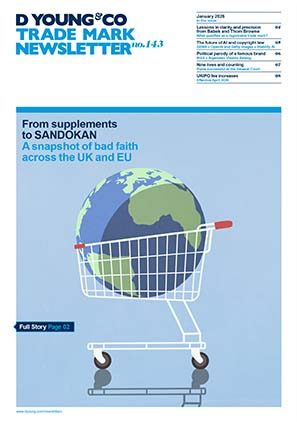FIDELITY & FIDELIS: no likelihood of confusion
In Fil v Fidelis, the Patents Court of England & Wales has held that various trade marks including the word FIDELITY for “insurance services”, “financial services” and “investment services” were partially invalid and not infringed by the sign FIDELIS for similar services.
Background
The claimant, Fil, had provided investment management services under the brand FIDELITY since 1979 to private and corporate clients in the UK. It was the owner of various trade marks for FIDELITY, which covered “financial services”, “insurance services” and “investment services”.
The defendant, Fidelis, underwrote specialty insurance (for example, relating to aviation, marine and terrorism), reinsurance and retrocession in the UK and had done so since 2016. Specialty insurance is provided only to commercial undertakings, and not to the retail market.
Fil objected to use of FIDELIS in its word and stylised forms and brought trade mark infringement proceedings (likelihood of confusion and reputation claims) and a claim for passing off.
Fidelis denied infringement and counterclaimed that the trade marks were invalid on the ground that they were descriptive or should be revoked for non-use.
It was accepted that the passing off claim succeeded or failed with the trade mark infringement claims.
Counterclaims
In its counterclaim, Fidelis argued that FIDELITY was descriptive of “insurance services” as fidelity insurance was a recognised type of insurance (defined in the Oxford English Dictionary as: “insurance taken out by an employer to indemnify him against losses incurred through the dishonesty or non-performance of an employee”). The judge, Mr Justice Arnold, agreed with this in principle but held that, per Omega Engineering v Omega SA, Fil could exclude “fidelity insurance” from its specification to overcome the objection.
Fidelis also counterclaimed that “financial services” covered by the earlier marks lacked clarity and precision. Mr Justice Arnold held that whilst this was arguable, the extent to which a mark should be declared invalid on this basis is unclear and is the subject of a pending reference to the Court of Justice of the European Union (Sky v Skykick).
Various other counterclaims including on the grounds of non-use and bad faith (no intention to use) were advanced. Mr Justice Arnold held with regard to insurance services that there was genuine use of FIDELITY in relation to “pension-related insurance services” and that it should be limited accordingly. In relation to bad faith, Mr Justice Arnold held that Fil was unlikely to have acted in bad faith; however the current state of the law is uncertain pending a reference to the CJEU in Sky v Skykick.
The court then turned to assessing whether, in the event that the marks were valid, they were infringed on the basis of the likelihood of confusion and reputation claims.
Likelihood of confusion
The basis for the assessing likelihood of confusion were the word marks for FIDELITY covering “investment services”, “insurance services except fidelity insurance”, “pension-related insurance services” and “financial services” other than “insurance services”.
The court held that FIDELITY was inherently distinctive in relation to “investment services”, “insurance services except fidelity insurance” and “financial services” and furthermore that Fil enjoyed an enhanced degree of distinctiveness for FIDELITY in relation to retail investment services and pensions structured as unit-linked insurance policies.
When comparing the marks, FIDELITY and FIDELIS were held to be visually similar to a high degree, taking into account that consumers read left-to-right and that the only difference is in the endings which holds less significance. The marks were further held to be aurally similar, noting again that the differences in the endings is less significant, as consumers have a tendency to slur the endings. Conceptually, both marks derive from the same Latin root meaning faithful or loyal and the court considered that whilst most consumers do not understand Latin, investment and insurance professionals would be more likely to appreciate the meaning of ‘fidelis’ and consumers who knew no Latin would nevertheless think there is some commonality of meaning between FIDELITY and FIDELIS even if they did not understand why.
Despite this, the court held that there was no likelihood of confusion. A key factor in its decision was the attributes of the average consumer. Fil contended that the consumers of “insurance services except fidelity insurance” included the general public and professionals; whilst Fidelis focused upon the specialist nature of its services and claimed that they were provided to “knowledgeable clients exercising a high degree of care and attention, almost invariably through brokers who are even more knowledgeable, careful and attentive”. The judge agreed with Fidelis, holding that the average consumer, in this instance, would be highly knowledgeable, careful and attentive.
In assessing similarity of services and the likelihood of confusion, Mr Justice Arnold held that, while Fidelis’ services were considered moderately similar to “pension-related insurance services” and that there was a convergence between different areas of financial services including insurance and investment, because of the knowledgeable and attentive nature of the average consumer, they were not likely to be confused. He observed that this was supported by the absence of any actual confusion, taking into account the three years of trading by Fidelis.
Reputation
The infringement claims under this ground were also unsuccessful, despite the court finding that the earlier marks have a reputation and that the average consumer would make a link between the marks FIDELIS and FIDELITY.
The court reasoned that, due to the specialist nature of Fidelis’ services and the specific attributes of the average consumer, there was no damage to the distinctive character of FIDELITY.
Further, it held that there was no unfair advantage taken of the reputation of FIDELITY because Fidelis had built its business on the strength of the personal reputations of its founders.
In short
This case demonstrates the increasing issues with enforcing trade marks where the class of goods or services for which they are registered is broad. It is also notable that, whilst the unresolved elements of the counterclaims did not affect the finding of non-infringement, there are outstanding issues regarding the lack of clarity and precision and bad faith pending the CJEU decision in Sky v Skykick. This will result in some continuing uncertainty for claimants when seeking to enforce their trade marks.
Case details at a glance
Jurisdiction: England & Wales
Decision level: High Court (Patents Court)
Parties: Fil Limited, Fil Investment Services Limited and Fidelis Underwriting Limited, Fidelis Insurance Bermuda Limited, Fidelis Insurance Holdings Limited and Fidelis Marketing Limited
Date: 11 May 2018
Citation: [2018] EWHC 1097 (Pat)
[2018] EWHC 1097 (Pat) - full decision
FIL Ltd & Anor v Fidelis Underwriting Ld & Ors [2018] EWHC 1097 (Pat) (11 May 2018)
Read more
